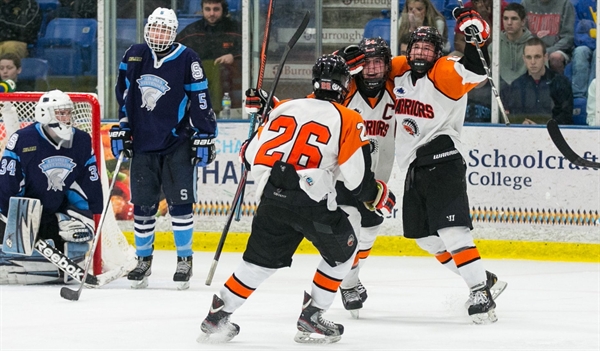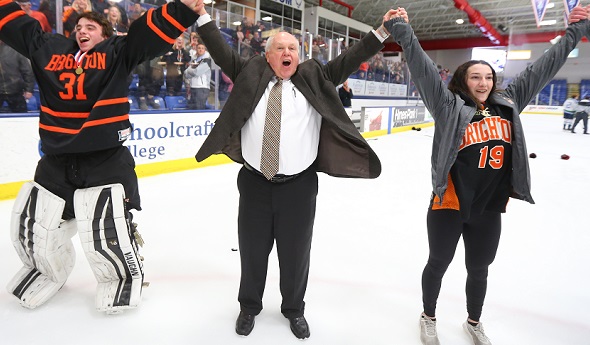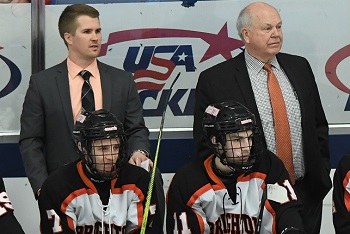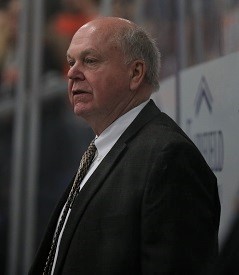
Manning Up for Brother Rice Title Run
March 14, 2015
By Bill Khan
Special for Second Half
PLYMOUTH — For Matt Manning, there were no hard feelings.
From his standpoint, it was a clean hockey play, even though a penalty was called on his opponent.
He just happened to be on the wrong end of a devastating hit that nearly deprived him of his senior season at Birmingham Brother Rice and the opportunity to lead his team to an MHSAA championship.
In a scrimmage on Nov. 17, two days before the season opener against Livonia Stevenson, Manning was forechecking on a penalty kill when he got the puck and slipped it behind a defender. With his head down as he was chasing the puck, Manning never saw what was coming.
"This kid just came from my blind side," the 5-foot-6 Manning recalls. "He got me in the right spot. He was a lot bigger than me. He won that battle."
But Manning and his teammates were the ultimate winners Saturday. He was in the stands as a freshman when Brother Rice won its last MHSAA title, in 2012, but was a key reason why the Warriors won their fourth with a 6-3 victory over Livonia Stevenson at Compuware Ice Arena.
Manning didn't immediately realize he was injured back in November, but he felt sharp pain when he tried to move his left arm on his way back to the bench. His left collarbone had been broken in half, an injury that required a plate and seven screws to repair.
Manning experienced some dark days in the immediate aftermath of the injury.
"It killed my confidence, basically, because we were just starting the season," he said. "We hadn't played our first game. It was the first scrimmage, the third shift. I was getting down about it. After that, and getting through the therapy, realizing it was going to get better with all the sessions we had, it just got much better a lot quicker."
Manning was back in the lineup on Jan. 7, adding a high-end talent to a team already ranked No. 1 in Division 2.
Manning had only one assist Saturday, but makes an impact as a tenacious, high-energy forechecker that isn't always quantified on the scoresheet. Stevenson coach David Mitchell agreed that Manning's presence was a huge plus for Brother Rice, which beat Stevenson 4-3 in the teams' season opener on Nov. 19 in Livonia.
 "You saw some things around the net today where he made plays that were special hockey plays," Mitchell said. "It's tough playing an opponent like him, but I'm thrilled he's in high school hockey and he's helping high school hockey grow. Having a player like that in our game makes our game better and makes the level of competition better for everybody and more enjoyable for people to watch."
"You saw some things around the net today where he made plays that were special hockey plays," Mitchell said. "It's tough playing an opponent like him, but I'm thrilled he's in high school hockey and he's helping high school hockey grow. Having a player like that in our game makes our game better and makes the level of competition better for everybody and more enjoyable for people to watch."
Brother Rice coach Lou Schmidt, in his 12th year with the Warriors, said Manning's comeback from a major injury was remarkable.
"I've never in my years seen anybody come back like he did," Schmidt said. "Usually, there's this very cautionary period where you don't want to get hit. He started skating five weeks after the injury; you never would've known he was out. He was a huge addition to our team. He made us deeper, he made us better."
Brother Rice wouldn't have had the opportunity to play for the title on Saturday had Manning not scored on a backhander 25 seconds into the fourth overtime to give the Warriors a 4-3 victory over Hartland in the Quarterfinals on Tuesday. It was one of two one-goal victories for the Warriors on their march to the championship.
Although Brother Rice won by three goals, the Warriors found themselves in another tough battle against a Stevenson team that was two years removed from an MHSAA championship.
Brother Rice dominated the early going, outshooting Stevenson 10-2 in the first period and taking a 2-0 lead just 53 seconds into the second period on a goal by Joey Vassallo.
The Warriors swarmed the Spartans' net after that in search of a knockout blow, only to be thwarted by junior goalie Cullen Barber.
After going without a shot on its first two power plays, Stevenson injected some life into the building when Alex Allen scored on the power play at 8:41 of the second period. The Spartans quickly tied it when Joe Alcantara scored at the 10:36 mark.
"I'm so proud of our guys," Mitchell said. "I think everybody saw it had the potential to get away when it was 2-0 and they were still carrying the play. But like we did all year, we answered back and made a game of it, which was great not only for us, but for the game of high school hockey. That second period was exciting. It's good that it was a good, solid hockey game that I hope did high school hockey proud."
Brother Rice regrouped and regained its two-goal lead on goals by Brendan Pyc at the 12:58 and 16:19 marks of the second.
"It was a big momentum shift when they scored their first one," said Brother Rice senior Nick Rosa, the only player remaining from the 2012 championship team. "When they got the second one, we knew we had to get the next one; that was big."
Stevenson got back within striking distance when Vince Glenn scored on the power play 44 seconds into the third period. Rosa's team-leading 25th goal of the year with 8:58 remaining in the game re-established Brother Rice's two-goal cushion.
Stevenson failed to click on two late power plays before the Warriors put an exclamation point on the championship with an empty-net goal by Jack Dansbury with 20.3 seconds to go.
"It's the longest journey ever," Rosa said. "Nine months ago, we started working out in the summer five days a week. We never stopped. This was our ultimate goal. We achieved it. Every day we came to practice and tried our best. I'm really proud of the boys."
Brother Rice was 3 for 4 on the power play, while Stevenson was 2 for 6.
"It was a special teams kind of day," Schmidt said. "We played well when we had to. We made it interesting there in the second — maybe for the fans, but not so much for the coaches."
PHOTOS: (Top) Brother Rice celebrates one of six goals Saturday against Livonia Stevenson. (Middle) Stevenson’s Nate Sudek drives into the Warriors’ zone during the Division 2 Final. (Photos by Andrew Knapik/Southgate).

Brighton Coach's Impact 'Immeasurable'
By
Tim Robinson
Special for MHSAA.com
October 7, 2020
By Tim Robinson
Special for Second Half
Paul Moggach has never been much for looking back.
 And as he begins his first season away from the Brighton hockey program in more than three decades, he’s still looking ahead.
And as he begins his first season away from the Brighton hockey program in more than three decades, he’s still looking ahead.
“I’m thinking about what I’m going to miss more than the mark I left,” he said in a phone conversation last week. “I guess I enjoyed so much of the time I had, the opportunity to coach at Brighton, I’m thinking more how I fill the time and the things I'll miss.”
Moggach (pronounced MUG-uth) retired as Brighton’s coach this past summer after 25 seasons and having led five teams to MHSAA Division 1 championships. He compiled a record of 466-172-47 during that period.
But that’s not what he remembers most, nor why he wants people to remember him.
“I would like them to remember the teams and players who played for me and my assistants, more than me,” Moggach said. “We have so many blessings and opportunities in our lives, and hockey was one for me and hopefully for the players and assistants I worked with.”
One of those assistants was Kurt Kivisto, who joined the Bulldogs originally as a team manager more than 20 years ago and was a player at Brighton. He eventually won a national championship at Michigan State before rejoining the program as an assistant coach a decade ago.
“The No. 1 thing I’ll take from him is sticking by your beliefs and not sacrificing those beliefs for the team,” said Kivisto, who was named Moggach’s successor in September. “He sticks by those beliefs and ... he’s not willing to sacrifice that even if it could hurt the team. The character and integrity he has, how he treats people with fairness and what he believes is right is the biggest thing I’ll take.”
A stepson, Damon Whitten, played for Moggach at Brighton and at MSU before becoming an assistant coach and eventually the head coach at Lake Superior State, where he is in his eighth season.
Asked about Moggach’s impact at Brighton, Whitten said, “I’m not sure you can measure it. Your mind goes to the hockey players who have come to Brighton, and that’s a big part. But I think it goes beyond that. The money they’ve raised over the years for different families in need, for example. He’s had a big impact, and the players he had were a big part of that, but it goes well beyond that, and he did it the right way. Thirty-plus years (in the program), and I’m not sure you can count more than a handful of times where he made a bad decision or handled things poorly. He did things the right way, every day, all of the time, and I think it’s why he was so successful for so long.”
 The team’s charitable works were mostly kept under the radar – Moggach’s reasoning being his players had been given much, it was their turn to give back, and he didn’t want people thinking they did those things for publicity.
The team’s charitable works were mostly kept under the radar – Moggach’s reasoning being his players had been given much, it was their turn to give back, and he didn’t want people thinking they did those things for publicity.
Moggach joined Rick Bourbonais as an assistant at Brighton in the mid-1980s, then switched roles with him for the 1996-97 season.
He realized Brighton’s potential in the 1992-93 season, when the Bulldogs upset perennial state power Trenton in the Class A Quarterfinals before losing to Detroit Catholic Central in a Semifinal.
“That, to me, said, at least in my mind, that we can do this,” Moggach said. “It’s not impossible.”
He slowly began to build the program, getting good players and a schedule that would challenge them.
“You get the players by building a good culture,” he said. “Back in the day, when I started, we weren’t very disciplined and our league wasn’t very disciplined. So I think we realized we had to build that, and I could have an influence on building that in Brighton.”
Along with the culture, Moggach looked for an edge whenever he could find it. He was talked into making a trip to the Keweenaw Peninsula by one of his player’s parents, and found enormous benefits for his team, both competitively and in team bonding.
“It’s a lot about the little things we do,” he said, “that we find joy in, and create those opportunities. Creating the little moments really can build to bigger moments. We played capture the flag one day in about two feet of snow.
“Almost killed them,” he added, chuckling. The exhausted players didn’t have much left for the game that night, but spending time together for four days in a bus and hotel room always brought the team closer on and off the ice.
That first UP expedition also led to more teams making the trip, for team bonding and a glimpse of a part of the state, and themselves, they might never have seen otherwise.
“We didn’t do that for long,” he said. “But we always came back saying we were better together because of that experience.”
Bob Nelson had three sons play for Moggach, and Nelson’s wife, Kris, was president of the team’s booster club during their involvement over nearly a decade in Brighton hockey. Nelson also coached the program’s younger players for five seasons.
“We got to know the Moggachs really well,” he said. “It was a good experience, both as a coach and as a parent as well.”
Moggach introduced other things, including an emphasis on nutrition and off-ice training, that players resisted at first until they saw the benefits.
 He savored conversations with referees and opposing coaches before the games and even the occasional reporter after games.
He savored conversations with referees and opposing coaches before the games and even the occasional reporter after games.
But his first priority was the players. At times he would erupt in practice at a player or, more commonly, the team, and the boys soon learned to hear the message, not the volume. But for a couple of seasons, they also wrote some of his wilder statements down in a notebook after practice.
One year, they read some of them at the banquet, and after each one, Moggach’s wife, Sharon, would look at him and ask, “Did you really say that?”
Moggach would laugh and confess to remembering he had actually done so, then laughing.
“He knew part of what made the program good was his relationship to the players,” Nelson said. “If it was a good time, he wanted to enjoy it, even at his own expense at times.”
Moggach has staying in the background this offseason, letting Kivisto shape the team.
Asked if he were willing to fully switch coaching roles, as he and Bourbonais did a quarter-century ago, Moggach laughed.
“No,” he said emphatically. “Rick wasn’t in his 70s when we made the switch. Kurt needs his time. I’ll be there if he needs me.”
Moggach, who is 74, still works fulltime as the University of Michigan’s director of risk management.
He plans to spend more time with his wife and watch his grandsons play hockey, as well as catching some Lake Superior State games.
“I was really blessed to have Rick and Brownie (longtime assistant Mike Brown) along for the ride, and then to get Kurt involved,” Moggach said. “They weren’t the only ones, but they were the kids for me.
“The other thing is the support from the Brighton (High School) administration, the teachers, and our community. There are more people to thank than I could ever bring up. I do think that, all together, it was a great run. It couldn’t have been any better.”
PHOTOS: (Top) Recently-retired Brighton hockey coach Paul Moggach celebrates the 2018 Division 1 championship game win over Saginaw Heritage at USA Hockey Arena. (Middle) Former player Kurt Kivisto, left of Moggach during the 2018 Semifinal win over Detroit Catholic Central, served as an assistant before assuming the head coaching job in September. (Below) Brighton's 2018 championship was its fifth under Moggach. (Photos by Hockey Weekly Action Photos.)

